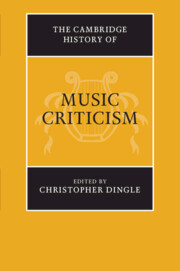Book contents
- The Cambridge History of Music Criticism
- The Cambridge History of Music
- The Cambridge History of Music Criticism
- Copyright page
- Contents
- Music Examples, Figures and Tables
- Notes on Contributors
- Acknowledgements
- Introduction
- Part I The Early History of Music Criticism
- Part II The Rise of the Press
- Part III Critical Influence and Influences
- 12 Critiquing the Canon: The Role of Criticism in Canon Formation
- 13 Comparing Notes: Recording and Criticism
- 14 The Gender Paradox: Criticism of Women and Women as Critics
- Part IV Entering the Twentieth Century
- Part V New Areas
- Part VI Developments since the Second World War
- Postlude
- Bibliography
- Index
14 - The Gender Paradox: Criticism of Women and Women as Critics
from Part III - Critical Influence and Influences
Published online by Cambridge University Press: 21 August 2019
- The Cambridge History of Music Criticism
- The Cambridge History of Music
- The Cambridge History of Music Criticism
- Copyright page
- Contents
- Music Examples, Figures and Tables
- Notes on Contributors
- Acknowledgements
- Introduction
- Part I The Early History of Music Criticism
- Part II The Rise of the Press
- Part III Critical Influence and Influences
- 12 Critiquing the Canon: The Role of Criticism in Canon Formation
- 13 Comparing Notes: Recording and Criticism
- 14 The Gender Paradox: Criticism of Women and Women as Critics
- Part IV Entering the Twentieth Century
- Part V New Areas
- Part VI Developments since the Second World War
- Postlude
- Bibliography
- Index
Summary
In May 2014 a storm erupted in the British classical music world when five established male critics fat-shamed Irish mezzo-soprano Tara Erraught, who was performing Octavian in Der Rosenkavalier at Covent Garden. Instead of focusing upon Erraught’s technique or interpretation, the critics ridiculed her physique. Writing in the Financial Times Andrew Clark referred to Erraught as ‘a chubby bundle of puppy-fat’; Michael Church in The Independent and Rupert Christiansen in The Telegraph both described her as ‘dumpy’; Andrew Clements in The Guardian called her ‘stocky’; and Richard Morrison in The Times characterised her as ‘unbelievable, unsightly and unappealing’. Although these sexist comments drew widespread condemnation, they are symptomatic of a centuries-old tendency for empowered male critics to fail to produce objective assessments of female musicians.
- Type
- Chapter
- Information
- The Cambridge History of Music Criticism , pp. 272 - 290Publisher: Cambridge University PressPrint publication year: 2019
- 2
- Cited by

